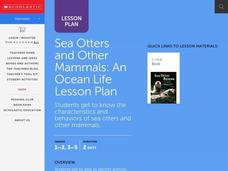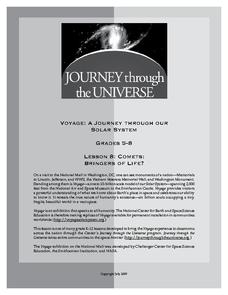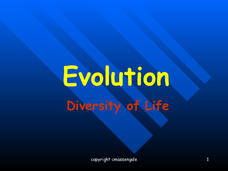Curated OER
Animal Life Cycles
Learners participate in numerous activities to gather information about parts of the life cycle. In this life science lesson, the teacher choose from a number of activities to create or support an interdisciplinary unit about the life...
Curated OER
Ocean Life
Young scholars identify marine mammals according to specific characteristics. Students read about marine mammals and list their characteristics. Next, young scholars play a Whale and Otter game on the playground to simulate whales...
Curated OER
Ocean Animals - Fill in the Missing Vowels
Learners look at 8 pictures of ocean animals and fill in the missing vowel for each ocean animal. This worksheet is a very goo way for young learners to practice their vowel sounds and spelling rules.
Curated OER
Ocean Animals Picture Matching
In this ocean animals matching worksheet, students draw a line from each ocean animal picture on the left side of the page to the matching picture on the right side of the page. There are 6 images to match to their pair.
Teach Engineering
The Great Pacific Garbage Patch
The Great Pacific Garbage Patch is one of several garbage patches around the world where garbage accumulates naturally. As part of a GIS unit that combines oceanography, environmental science, and life science, class members investigate...
NOAA
Currents
Learn how ocean currents are vital to humans and marine life. The eighth installment of a 23-part NOAA Enrichment in Marine sciences and Oceanography (NEMO) program, focuses on ocean currents and how they affect global climate. The...
NOAA
Coastal Dynamics
Life's a beach! The 16th installment of a 23-part NOAA Enrichment in Marine sciences and Oceanography (NEMO) program first examines different types of coasts and how they form. An activity then has learners investigate the shoreline...
NOAA
Technology II
Ping, ping, ping. The last installment of a 23-part NOAA Enrichment in Marine sciences and Oceanography (NEMO) program explores technology use in marine studies, such as sonar. Activity involves simulating sonar techniques to identify a...
NOAA
Ocean Exploration
Where am I? The second installment of a 23-part NOAA Enrichment in Marine sciences and Oceanography (NEMO) program starts with pupils guessing the years in which major ocean exploration events took place. The instructional activity then...
Journey Through the Universe
Comets: Bringers of Life?
Young scientists investigate the elements found in our solar system and then construct a model of a comet. They apply their new knowledge to the formation of the solar system.
Science Matters
Blubber Gloves: It’s All About Insulation
Instill the concept of adaptation with the help of Blubber Gloves—ziplock bags, shortening, and duct tape. Scholars discuss how animals and plants keep warm in polar regions, record their predictions, and try on their Blubber Gloves to...
Baylor College
How Much Water Do Humans Need?
Physical or life science learners measure the amounts of water eliminated by intestines and the urinary system, and the amounts lost via respiration and perspiration. In doing so, they discover that the body's water must be replenished...
Desert Discoveries
Sonoran Desert ABC's
Third graders make alphabet cards that depict the wide variety of life forms found in the Sonoran Desert. A terrific lesson that combines language arts, visual arts, and life science all into one wonderful package. Each of the cards has...
Core Knowledge Foundation
A Time for All Seasons - Fall
The weather is cooling down and the leaves are starting to change color; fall is right around the corner. Celebrate this special time of year with this earth and life science lesson series that teaches children about the causes of...
MENSA Education & Research Foundation
The Cell: the Building Blocks of Life
Do you have early finishers asking what they can do next, or any budding scientists eager to learn more about plant and animal cells? Then here is a cell unit for you! The packet provides scholars with everything they need in order to...
NOAA
El Niño
El Nino, La Nina ... and the Santa Maria? The 11th installment of a 23-part NOAA Enrichment in Marine sciences and Oceanography (NEMO) program explains the mechanism of El Nino/Southern Oscillation. Pupils use previous data to determine...
NOAA
Sediments
Calcareous ooze ... what an interesting name! The 15th installment of a 23-part NOAA Enrichment in Marine sciences and Oceanography (NEMO) program focuses on sediments found on the ocean floor. After viewing the slideshow lecture,...
NOAA
The Dead Zone
The fifth installment of a 23-part NOAA Enrichment in Marine sciences and Oceanography (NEMO) program defines dead zones and how they form. Pupils then examine data from the Gulf of Mexico to determine dead zone formation.
Curated OER
Body Parts
In this science worksheet, students identify the placement of the main parts of the human body. Students begin by cutting out the head and torso pieces and pasting them and the smaller body parts in the proper location.
NOAA
Tides
Sometimes low, sometimes high, but always in motion! Explore Earth's tidal system in the 10th interactive in a series of 13. Engaging life and earth science students alike, the versatile resource demonstrates cause and effect between...
Wilderness Classroom
Ocean Life
Our oceans are composed of many complex relationships. Young oceanographers explore relationships between organisms, understand the world ocean's currents, and discover the effects of water pollution and how it behaves. There are three...
Exploring Nature Educational Resources
Building A Classroom Food Web
From bears and owls to chipmunks and trees, all life depends on the sun for the energy to survive. Young biologists develop an understanding of this big idea as they arrange this series of plant and animal picture cards into food webs...
It's About Time
Life (and Fewer Deaths) After Seat Belts
Seat belts reduce serious crash-related injuries and deaths by about half. Scholars continue crashing their cart with a crash test dummy into a wall, but this time, they experiment with different types of seat belts to reduce injuries....
Biology Junction
Evolution – Diversity of Life
Scientists noticed animals with backbones share similar bone structure despite having different forms, such as fins, arms, and wings. Young scientists gain an appreciation for evolution by understanding the history of the theory. They...

























